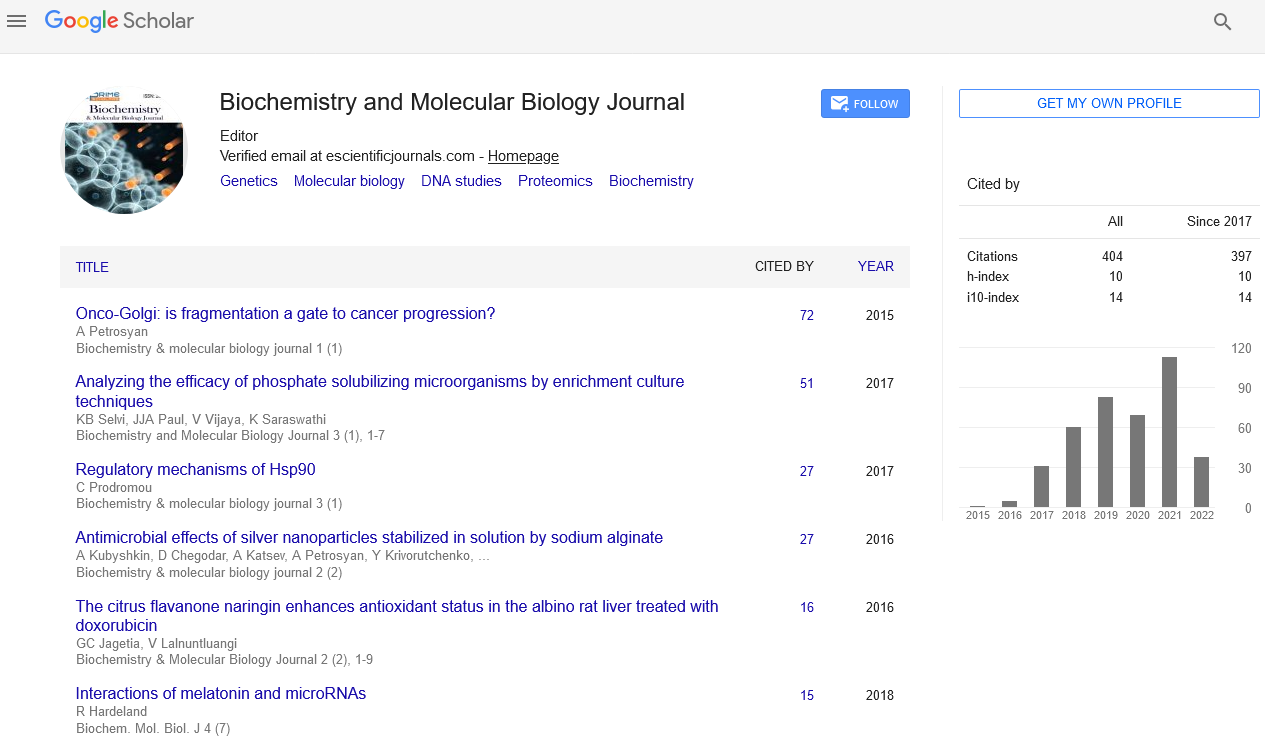Perspective - (2024) Volume 10, Issue 4
Cell Signaling in Cancer: Unraveling the Complex Web of Tumor Growth
Gen Decaix*
Department of Biology, College of Peru, Peru
*Correspondence:
Gen Decaix,
Department of Biology, College of Peru,
Peru,
Email:
Received: 31-Jul-2024, Manuscript No. IPBMBJ-24-21593;
Editor assigned: 02-Aug-2024, Pre QC No. IPBMBJ-24-21593 (PQ);
Reviewed: 16-Aug-2024, QC No. IPBMBJ-24-21593;
Revised: 21-Aug-2024, Manuscript No. IPBMBJ-24-21593 (R);
Published:
28-Aug-2024, DOI: 10.36648/2471-8084-10.04.38
Introduction
Cell signaling is a fundamental process in cellular communication,
orchestrating a wide array of physiological responses and
maintaining homeostasis. However, when this signaling becomes
dysregulated, it can contribute to the development and
progression of cancer. Cancer is a complex and heterogeneous
disease, characterized by uncontrolled cell growth and spread. A
critical understanding of cell signaling pathways in cancer provides
insights into tumor biology and opens avenues for targeted
therapies. This article explores the role of cell signaling in cancer,
focusing on key pathways, their implications, and emerging
therapeutic strategies. Cell signaling pathways are networks
of proteins and molecules that transmit signals from the cell
surface to its interior, influencing various cellular processes such
as growth, differentiation, and survival. In cancer, these pathways
often become aberrant, leading to unchecked cell proliferation
and tumorigenesis.
Description
Aberrant cell signaling not only drives cancer initiation but also
contributes to tumor progression and metastasis. Dysregulated
signaling pathways can enhance tumor cell survival, angiogenesis
(the formation of new blood vessels to supply the tumor), and the
ability to invade surrounding tissues. For instance: Cancer cells
can modify their microenvironment to support their growth and
survival. Signaling pathways involved in inflammation and immune
responses can be hijacked to create a favorable environment
for tumor progression. Abnormal signaling pathways can also
contribute to resistance to conventional therapies. Tumor cells
may activate alternative pathways to evade the effects of targeted
therapies or chemotherapy, making treatment more challenging.
Understanding the role of cell signaling in cancer has led to the
development of targeted therapies designed to specifically
inhibit dysregulated pathways. These therapies aim to disrupt the
abnormal signaling that drives cancer, offering more precise and
effective treatment options. Small molecules that inhibit specific
components of signaling pathways are used to target cancer
cells with particular genetic alterations. For example, tyrosine
kinase inhibitors like imatinib target the BCR-ABL fusion protein
in Chronic Myeloid Leukemia (CML), while mTOR inhibitors like
everolimus are used in various cancers with hyperactive PI3K/Akt/
mTOR signaling. Monoclonal antibodies can be designed to target
specific proteins involved in signaling pathways. For instance,
trastuzumab herceptin targets the HER2 receptor in HER2-positive
breast cancer, inhibiting its signaling and slowing tumor growth.
Emerging immunotherapies, such as checkpoint inhibitors,
harness the body’s immune system to target cancer cells. These
therapies can be combined with targeted therapies to enhance
their efficacy. For example, immune checkpoint inhibitors that
block PD-1 or PD-L1 can reinvigorate immune responses against
tumors with aberrant signaling. Despite significant progress,
challenges remain in targeting cell signaling pathways in cancer.
Tumor heterogeneity, the development of resistance, and offtarget
effects are ongoing concerns. Future research is needed
to better understand the complexity of signaling networks and
develop strategies to overcome resistance.
Conclusion
Advances in technology, such as next-generation sequencing
and personalized medicine, are paving the way for more tailored
approaches. By combining insights into signaling pathways with
patient-specific genetic information, researchers aim to develop
more effective and individualized cancer treatments. In conclusion,
cell signaling plays a crucial role in cancer by driving tumor growth,
progression, and resistance to therapy. Advances in understanding
these pathways have led to the development of targeted therapies
and novel treatment strategies. As research continues to evolve, a
deeper comprehension of cell signaling in cancer holds the promise
of more effective and personalized therapeutic interventions,
ultimately improving outcomes for cancer patients.
Citation: Decaix G (2024) Cell Signaling in Cancer: Unraveling the Complex Web of Tumor Growth. Biochem Mol Biol J. 10:38.
Copyright: © 2024 Decaix G. This is an open-access article distributed under the terms of the Creative Commons Attribution License, which permits unrestricted use, distribution, and reproduction in any medium, provided the original author and source are credited.

